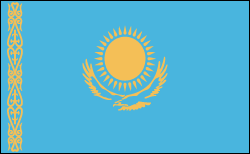Kazakhstan History


History
The indigenous Kazakhs were nomadic Turkic people who belonged to several divisions of Kazakh hordes. They grouped together in settlements and lived in dome-shaped tents made of felt called yurts. Their tribes migrated seasonally to find pastures for their herds of sheep, horses, and goats. Although they had chiefs, the Kazakhs were rarely united as a single nation under one great leader. Their tribes fell under Mongol rule in the 13th century and they were dominated by Tatar khanates until the area was conquered by Russia in the 18th century.
The area became part of the Kyrgyz Autonomous Republic formed by the Soviet authorities in 1920, and in 1925 this entity's name was changed to the Kazakh Autonomous Soviet Socialist Republic (Kazakh ASSR). After 1927, the Soviet government began forcing the nomadic Kazakhs to settle on collective and state farms, and the Soviets continued the czarist policy of encouraging large numbers of Russians and other Slavs to settle in the region.
Owing to the region's intensive agricultural development and its use as a testing ground for nuclear weapons by the Soviet government, serious environmental problems developed by the late 20th century. Along with the other central Asian republics, Kazakhstan obtained its independence from the collapsing Soviet Union in 1991. Kazakhstan proclaimed its membership in the Commonwealth of Independent States on December 21, 1991, along with ten other former Soviet republics.
Kazakhstan’s Ministry of Foreign Affairs also quickly built positive international relations with surrounding powers, importantly with Turkey. In 1993, the country overwhelmingly approved the Nuclear Non-Proliferation Treaty. President Nursultan Nazarbayev restructured and consolidated many operations of the government in 1997, eliminating a third of the government's ministries and agencies. In 1997, the national capital was changed from Almaty, the largest city, to Astana in a move to unite the north and south of the country.
Since then, Kazakhstan has existed in relative peace internationally. Nazarbayev was president from 1991 and remained until 2019 when large-scale protests finally forced him out of office. Kassym-Jomart Tokayev succeeded him and promised to reform the way Kazakhstan was governed after Nazarbayev’s authoritarian rule. Some policies have been brought in to democratize the country, such as limits on the amount of time a president can rule, but there remain concerns over whether Nazarbayev is still pulling strings behind the scenes.
Further protests in 2022 over the cost of living and the perceived lack of real change led to the complete removal of Nazarbayev from the government and further promises to make politics more even. It also led to the introduction of state-funded economic help with fuel bills. The country currently remains in an uncertain state with discontent bubbling amongst the general population.







